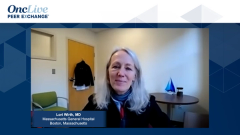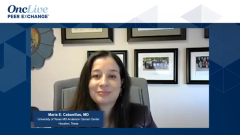
When to Initiate Therapy for Differentiated Thyroid Cancer
Maria E. Cabanillas, MD, describes what triggers her to initiate therapy for differentiated thyroid cancer and variables that impact treatment choice.
Episodes in this series

Lori Wirth, MD: Maria, do you want to talk a little about other things that might come into play in terms of making this decision about when to start treatment? I also want to reiterate Marcia’s point about there definitely being a role for disease monitoring. But we don’t necessarily want to withhold treatment until patients are symptomatic, because then I think the opportunity to enjoy the clinical benefits from the therapies we have that really do work very well is diminished. But Maria, what other factors are important that you take into account when you’re thinking about when to pull the trigger and start treatment for patients?
Maria E. Cabanillas, MD: It’s a combination of things. I look of course at the usual things, the performance status and comorbidities, that’s the obvious one. And usually by now I know what the genetics are. If I’m even thinking about doing systemic therapy, I’ve already sent their tumor off for molecular testing. And so, I start thinking about what would be the possible treatments for this patient? And what are the toxicities associated with that treatment in relation, how is that going to affect my patient who has all these different comorbidities? I really take that into consideration, what the adverse effects are of each drug and the potential drug that I need to use. I oftentimes will try to also see how I can reset their clock, meaning I’m trying to see if there’s a way that I can push that start date off another year, another 2 years. Because we know that with all of these targeted therapies, eventually these patients are not going to respond to them. If they respond initially, they won’t respond forever.
I try to push that start date off as much as I can. I think about whether there is some type of localized focal therapy that I can do in this patient to keep them off systemics for a little while longer. That might be resecting a metastasis. It might be giving them external beam radiation like SBRT [stereotactic body radiation therapy] to a growing lung metastasis. If everything else is stable and there’s one that’s giving us problems, I may biopsy it first to make sure it’s not anaplastic. But then I will give them some stereotactic radiation.
Is there a metastasis that’s going to cause a really big problem in this patient if I don’t do something about it? Maybe there’s a large hilar node, and even though the patient’s asymptomatic, it’s in a bad place. I probably don’t want to wait too long to treat that patient, or will keep a very close eye on the patient so that I can treat them in time before they develop a problem. Bone metastases are also the usual kind, thinking about whether they’re going to fracture, whether this is too close to the spinal cord and we need to do something before they become symptomatic from it.
Then I’m always thinking about brain metastases because we don’t think very much about brain metastases in differentiated thyroid cancer. We kind of associate that more with anaplastic thyroid cancer. But these patients can get brain metastases, and they’re asymptomatic until it’s no longer asymptomatic. Then you’ve got a big problem on your hands. And so, I do some brain surveillance too with MRI or CT. I don’t do it every time. I’ll sometimes think about doing it once a year in these patients and try to treat things before they become a problem.
Lori Wirth, MD: I’m glad you mentioned the incidence of brain metastases. In the studies that have been done that we need to start talking about very soon, there is an incidence of brain metastases in anywhere up to about 10% in our patients with advanced thyroid cancer. So it’s definitely something that I think has been underappreciated until recently.
Transcript edited for clarity.





































